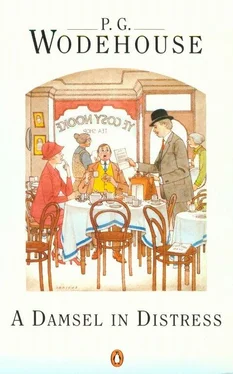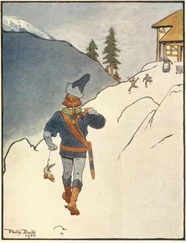“Get me a small bottle of champagne, and bring it to the library.”
“Yes, sir.”
The two words sound innocent enough, but, wishing as he did to efface himself and avoid publicity, they were the most unfortunate which George could have chosen. If he had merely bowed acquiescence and departed, it is probable that Lord Belpher would not have taken a second look at him. Percy was in no condition to subject everyone he met to a minute scrutiny. But, when you have been addressed for an entire lifetime as “your lordship”, it startles you when a waiter calls you “Sir”. Lord Belpher gave George a glance in which reproof and pain were nicely mingled emotions quickly supplanted by amazement. A gurgle escaped him.
“Stop!” he cried as George turned away.
Percy was rattled. The crisis found him in two minds. On the one hand, he would have been prepared to take oath that this man before him was the man who had knocked off his hat in Piccadilly. The likeness had struck him like a blow the moment he had taken a good look at the fellow. On the other hand, there is nothing which is more likely to lead one astray than a resemblance. He had never forgotten the horror and humiliation of the occasion, which had happened in his fourteenth year, when a motherly woman at Paddington Station had called him “dearie” and publicly embraced him, on the erroneous supposition that he was her nephew, Philip. He must proceed cautiously. A brawl with an innocent waiter, coming on the heels of that infernal episode with the policeman, would give people the impression that assailing the lower orders had become a hobby of his.
“Sir?” said George politely.
His brazen front shook Lord Belpher’s confidence.
“I haven’t seen you before here, have I?” was all he could find to say.
“No, sir,” replied George smoothly. “I am only temporarily attached to the castle staff.”
“Where do you come from?”
“ America, sir.”
Lord Belpher started. “ America!”
“Yes, sir. I am in England on a vacation. My cousin, Albert, is page boy at the castle, and he told me there were a few vacancies for extra help tonight, so I applied and was given the job.”
Lord Belpher frowned perplexedly. It all sounded entirely plausible. And, what was satisfactory, the statement could be checked by application to Keggs, the butler. And yet there was a lingering doubt. However, there seemed nothing to be gained by continuing the conversation.
“I see,” he said at last. “Well, bring that champagne to the library as quick as you can.”
“Very good, sir.”
Lord Belpher remained where he stood, brooding. Reason told him he ought to be satisfied, but he was not satisfied. It would have been different had he not known that this fellow with whom Maud had become entangled was in the neighbourhood. And if that scoundrel had had the audacity to come and take a cottage at the castle gates, why not the audacity to invade the castle itself?
The appearance of one of the footmen, on his way through the hall with a tray, gave him the opportunity for further investigation.
“Send Keggs to me!”
“Very good, your lordship.”
An interval and the butler arrived. Unlike Lord Belpher late hours were no hardship to Keggs. He was essentially a night-blooming flower. His brow was as free from wrinkles as his shirt-front. He bore himself with the conscious dignity of one who, while he would have freely admitted he did not actually own the castle, was nevertheless aware that he was one of its most conspicuous ornaments.
“You wished to see me, your lordship?”
“Yes. Keggs, there are a number of outside men helping here tonight, aren’t there?”
“Indubitably, your lordship. The unprecedented scale of the entertainment necessitated the engagement of a certain number of supernumeraries,” replied Keggs with an easy fluency which Reggie Byng, now cooling his head on the lower terrace, would have bitterly envied. “In the circumstances, such an arrangement was inevitable.”
“You engaged all these men yourself?”
“In a manner of speaking, your lordship, and for all practical purposes, yes. Mrs. Digby, the ‘ouse-keeper conducted the actual negotiations in many cases, but the arrangement was in no instance considered complete until I had passed each applicant.”
“Do you know anything of an American who says he is the cousin of the page-boy?”
“The boy Albert did introduce a nominee whom he stated to be ‘is cousin ‘ome from New York on a visit and anxious to oblige. I trust he ‘as given no dissatisfaction, your lordship? He seemed a respectable young man.”
“No, no, not at all. I merely wished to know if you knew him. One can’t be too careful.”
“No, indeed, your lordship.”
“That’s all, then.”
“Thank you, your lordship.”
Lord Belpher was satisfied. He was also relieved. He felt that prudence and a steady head had kept him from making himself ridiculous. When George presently returned with the life-saving fluid, he thanked him and turned his thoughts to other things.
But, if the young master was satisfied, Keggs was not. Upon Keggs a bright light had shone. There were few men, he flattered himself, who could more readily put two and two together and bring the sum to a correct answer. Keggs knew of the strange American gentleman who had taken up his abode at the cottage down by Platt’s farm. His looks, his habits, and his motives for coming there had formed food for discussion throughout one meal in the servant’s hall; a stranger whose abstention from brush and palette showed him to be no artist being an object of interest. And while the solution put forward by a romantic lady’s-maid, a great reader of novelettes, that the young man had come there to cure himself of some unhappy passion by communing with nature, had been scoffed at by the company, Keggs had not been so sure that there might not be something in it. Later events had deepened his suspicion, which now, after this interview with Lord Belpher, had become certainty.
The extreme fishiness of Albert’s sudden production of a cousin from America was so manifest that only his preoccupation at the moment when he met the young man could have prevented him seeing it before. His knowledge of Albert told him that, if one so versed as that youth in the art of Swank had really possessed a cousin in America, he would long ago have been boring the servants’ hall with fictions about the man’s wealth and importance. For Albert not to lie about a thing, practically proved that thing non-existent. Such was the simple creed of Keggs.
He accosted a passing fellow-servitor.
“Seen young blighted Albert anywhere, Freddy?”
It was in this shameful manner that that mastermind was habitually referred to below stairs.
“Seen ‘im going into the scullery not ‘arf a minute ago,” replied Freddy.
“Thanks.”
“So long,” said Freddy.
“Be good!” returned Keggs, whose mode of speech among those of his own world differed substantially from that which he considered it became him to employ when conversing with the titled.
The fall of great men is but too often due to the failure of their miserable bodies to give the necessary support to their great brains. There are some, for example, who say that Napoleon would have won the battle of Waterloo if he had not had dyspepsia. Not otherwise was it with Albert on that present occasion. The arrival of Keggs found him at a disadvantage. He had been imprudent enough, on leaving George, to endeavour to smoke a cigar, purloined from the box which stood hospitably open on a table in the hall. But for this, who knows with what cunning counter-attacks he might have foiled the butler’s onslaught? As it was, the battle was a walk-over for the enemy.
Читать дальше







